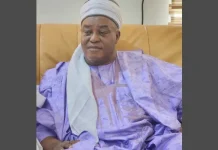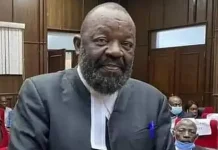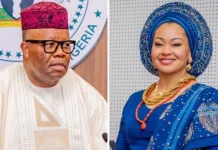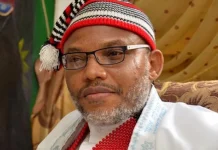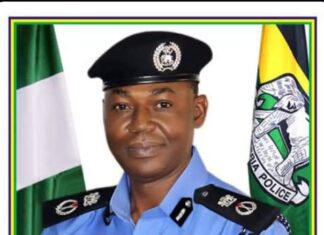The Economic and Financial Crimes Commission investigators questioned a number of high-ranking civil personnel connected to the scams on Wednesday, furthering their investigation into the problems at the Ministry of Humanitarian Affairs and Poverty Alleviation.
It was discovered that N50 billion was retrieved from the ministry of humanitarian affairs by the Independent Corrupt Practices and Other Related Offenses Commission.
The funds that were going to be embezzled were retrieved by the ICPC in July and August of 2023 and transferred to the Nigerian Central Bank.
Information surfaced that the fund, intended for citizens in need, was halted during attempts to move it into private bank accounts while it was under the leadership of former Minister Sadiya Umar-Farouq. It was subsequently retrieved by the ICPC, which was led by Bolaji Owasanoye.
The N50 billion was then given to the Federal Government, led by President Bola Tinubu, according to a reliable government source who spoke with our correspondent.
The source confirmed the news, saying, “President Tinubu had not yet named a new minister of humanitarian affairs when the cash were retrieved after the departures of Umar Farouq and previous President Muhammadu Buhari.
Fund recovered
“To mitigate the impact of the removal of fuel subsidies, President Tinubu directed the Accountant-General of the Federation to return the funds to the Ministry from the Infrastructure Support Fund for the 36 states and the Federal Capital Territory, following the appointment of Betta Edu, the now-suspended Minister of Humanitarian Affairs.”
The repaid amount is a portion of the N585 million that Edu was given permission to disburse and the N44 billion that was allegedly laundered in the National Social Investment Program Agency.
Additional information regarding the fund’s interception and recovery was provided by the following source: “The ICPC, led by Prof. Owasanoye, banned and retrieved N50 billion from the Ministry of Humanitarian Affairs during the naira shortage that occurred in late 2022 and early 2023.
After the commission looked into it more, N18 billion more was blocked and taken from the ministry in addition to the N32 billion that had previously been stopped and recovered. Due to a lack of cash during the naira redesign period, the ministry headed by the former minister, Umar-Farouq, was unable to deliver the funds intended for the nation’s impoverished and vulnerable citizens, as the ICPC discovered.
Between July and August of 2023, the funds were deposited into the government’s coffers. There was no new minister in place last year, and some ministry employees tried to transfer the money into personal accounts while the previous minister was out of office. When the ICPC learned of the dubious and dishonest way the funds were supposed to be disbursed, it promptly halted the funds, which were later recovered.
In order to mitigate the impact of the removal of fuel subsidies, President Tinubu announced the creation of the Infrastructure Support Fund for the 36 states and the Federal Capital Territory. The Federal Government then transferred the funds into the Humanitarian Affairs Ministry, which is headed by Betta Edu and is responsible for poverty alleviation initiatives.
Questioning civil servants
EFCC agents continued their investigation on Wednesday by questioning a number of top civil officers in the ministry of humanitarian affairs.
Despite the lack of clarity around the officials’ background, our reporter was informed with confidence that they provided the investigators with valuable evidence that helped them uncover financial misconduct within the ministry.
Along with former minister Sadiya Umar-Farouq, the investigators also met with Halima Shehu, the suspended CEO and National Coordinator of the National Social Investment Programme, an organization that falls under the humanitarian ministry, and suspended Minister of Humanitarian Affairs and Poverty Alleviation Betta Edu.
Umar-Farouq, a minister under former President Muhammadu Buhari, was under investigation for alleged N37 billion money laundering while Edu is being probed for approving the transfer of N585 million into the private account of a ministry accountant, Bridget Oniyelu.
But Shehu was under investigation for allegedly transferring N44 billion from the National Security Initiative into certain corporate and private accounts without the president’s consent.
The women arrived today (Wednesday), and they are assisting the commission, according to an EFCC source.
The EFCC has questioned director generals and other top officials working under the Ministry of Humanitarian Affairs, and they continue to do so. Senior bank officials continue to be questioned about the purported money laundering.
The N585 million payment, according to Edu, who was suspended by President Bola Tinubu on Monday, was intended for vulnerable populations in the states of Lagos, Ogun, Cross River, and Akwa Ibom.
Her media assistant, Rasheed Olarewaju, had asserted that it was permissible in the civil service for employees, particularly project accountants, to receive payments of this kind into their private accounts.
The minister’s request to deposit N585 million into the private account was not honored by the Office of the Accountant-General of the Federation, Dr. Oluwatoyin Madein.
As MDAs are self-accounting organizations, she noted, the AGF does not make payments on their behalf.
The Peoples Democratic Party and the Labour Party, meantime, have directed the anti-graft authorities to expand their current investigation to include all departments, ministries, and agencies that are connected to corrupt activities.
A probe of civil workers and other ministries “would bring some semblance of truthfulness into the system,” according to the LP, while the PDP said that corruption was still present in practically all MDAs.
According to Okechukwu Osuoha, the PDP’s deputy national legal adviser, all ministries should look into their public servants since they may be used as tools to commit fraud.
He stated that in addition to exposing the fraud, a comprehensive and all-encompassing probe would assist in monitoring the actions of civil officials across all ministries.
Indeed, Osuoha said, “The EFCC ought to look into other ministries.” Corruption persists among government servants and in other ministries. This is not the beginning of it. Corruption exists throughout our system, particularly in the public sector.
“Corruption is at its height; corrupt activities are not limited to the Ministry of Humanitarian Affairs; other ministries are also implicated in corrupt activities.” Misappropriation of public monies and embezzlement of funds are problems.
The government and relevant authorities ought to concentrate on each of them, therefore. An investigation of them is warranted.
“In most ministries, you will typically find civil officials engaging in numerous fraudulent acts. Due to their constant presence as fraud machinery, they are the most guilty. In light of this, all of them require investigation by the Federal Government and the anti-graft agencies.
Ibrahim Abdullahi, the PDP’s Deputy National Publicity Secretary, stated that more inquiries into other ministries and government employees are warranted.
Indeed, he said, the investigation needs to be comprehensive and include the government personnel. Deterrence against malicious and dishonest Nigerians would be its main function. It would also be wise to look at other ministries.
Group offers FG advice.
Yunusa Tanko, the spokesperson for the 2023 LP’s Presidential Campaign Council, also spoke and said that expanding the investigation to include all MDAs will contribute to the purification of the public service.
Ministers are powerless to act alone, according to Tanko, who demanded an open investigation. The entire process involves the government servants. The President ought to include more departments and government employees in the inquiry. It will aid in system sanitization.
The fact is that everyone is impacted when the head faces credibility issues. The difficulties facing leadership are the reason behind the unparalleled embezzlement of public funds occurring across many social classes.
Thus, when one fish’s head is rotting, it affects the others as well, which is why there is so much looting going on. But if the government really wants to clean up the system, then expanding the investigation to include more ministries and public employees will lend legitimacy to the investigation.
Going ahead, he reasoned, an open probe will reveal all the MDA machinations and the people behind them.
“Everything that happens in these ministries and inside the civil service is connected in some way, which makes this significant. Thus, one person is unable to undertake numerous acts of this kind. There are other people involved, somehow. Thus, an open inquiry will provide some approximation of the truth, he argued.
In support of the request to expand the current investigation to include additional MDAs, Debo Adeniran, Chairman of the Center for Anti-Corruption and Open Leadership, said that the EFCC should also interview the permanent secretary and other ministry directors, pointing out that they should have provided the minister with the appropriate training on public procurement.
He went on to say that in order to verify procurement orders, the ICPC should establish Anti-Corruption and Transparency desks in each ministry.
In actuality, the people who ought to have been detained and questioned the most were the Permanent Secretary, the Director, Finance, and Administration, and the Accounting Officer in that ministry. It is their responsibility to provide Betta Edu, the political appointee in that ministry, with the necessary training on civil service procedures regarding financial and procurement matters.
Every MDA, including the Ministry of Humanitarian Affairs, is intended to have a desk manned by the ICPC. ACTU, or Anti-Corruption and Transparency Unit, is the intended name for the ICPC desk in that ministry. Additionally, each procurement transaction will go through the ACTU desk, and the ACTU will check to see if the order complies with civil service regulations or not, the speaker stated.
Chido Onumah, the Coordinator of the African Center for Media Information and Literacy, expressed his support for additional investigation into the ministry of humanitarian affairs and other MDAs, stating that the case was “a door into possible scandals in other MDAs.”
This is only a doorway into what we all know—or assume—to be widespread corruption throughout ministries, departments, and agencies, the speaker said. I hope it gives the anti-graft authorities and this administration the chance to take action.
“Maybe not exactly, perhaps the minister understood what they were doing. However, the argument I’m attempting to make is that there is a grave lack of protocol and an institutional failure here.
“The permanent secretary is essentially the accounting officer, and in my opinion, it is appropriate for him or her to draft memoranda before submitting them to the minister after they have to go through certain formalities.
“There should be more inquiries made regarding what happened, regardless of who sent the memo to the minister directly or the permanent secretary.”
In the meanwhile, Abel Enitan, the Permanent Secretary of the Ministry of Humanitarian Affairs and Poverty Alleviation, has assumed leadership of the ministry’s operations subsequent to the suspension of Minister Edu.
President Bola Ahmed Tinubu sacked the minister on Monday in response to reports that N585 million had been transferred into a private account.
She’d been told to turn herself in to the permanent secretary and to help the investigative authorities while they carried out their inquiry.
Enitan took over after he supposedly received a letter on Monday night from the Government of the Federation’s Secretary’s office.
Join Television Nigerian Whatsapp Now
Join Television Nigerian Facebook Now
Join Television Nigerian Twitter Now
Join Television Nigerian YouTUbe Now


